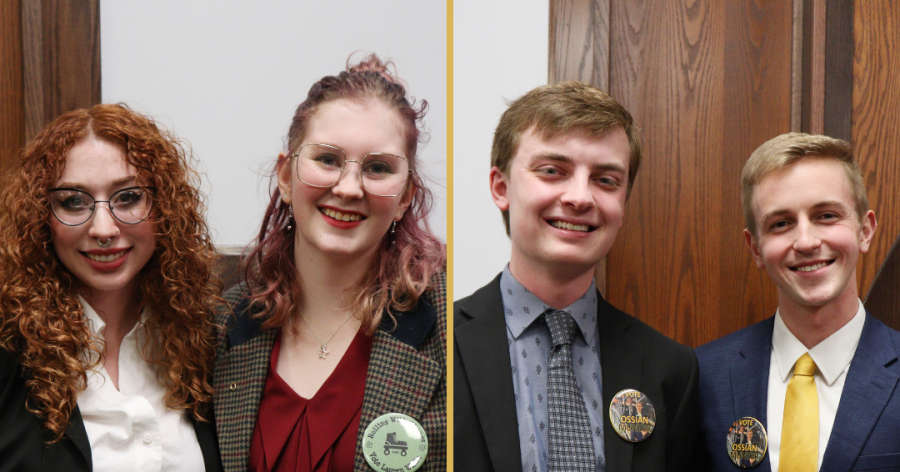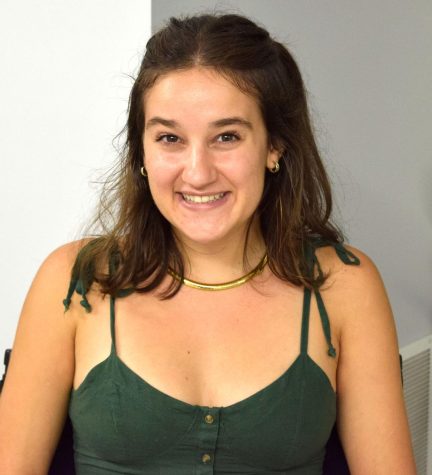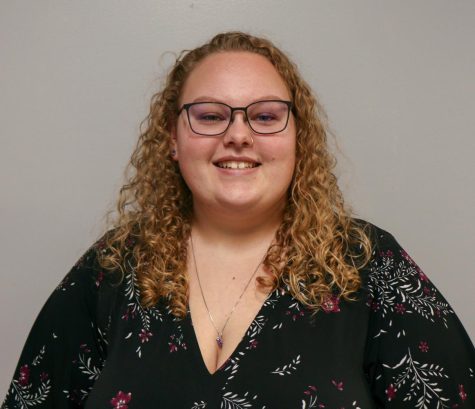Senate President Campaign trails come to a close with last forum
Left to Right: President candidate Lauren White, vice president candidate Charlie Kimsey, vice president candidate John Munter, president candidate Carter Ossian.
February 23, 2022
The Student Senate held a presidential issue forum on Feb. 15 where both candidates running for president of the organization, Lauren White and Carter Ossian, answered student questions and summarized their campaigns.
Both parties faced a student body of around 85 students, along with their respective vice-presidential candidates, Charlotte Kimsey with White and John Munter with Ossian.
After the introduction of the event’s moderator, Randy Bertolas, geography professor and chair of the History, Politics and Geography Department at Wayne State College, Ossian took the stand with support from his running mate.
Ossian began his speech by thanking those who sponsored the event and reinstating the importance of hearing directly from the students in such a setting. He then continued with an overview of his campaign promises and focuses.
The senator disclosed the results of an informal survey he conducted on campus during the weeks leading up to the election. According to Ossian, every student interviewed regarding their views of the Student Senate had negative things to say. This poor view of the organization, Ossian and Munter have declared to reverse.
“Though the odds have seemed stacked against us, John and I have looked at this and seen an opportunity,” Ossian said. “An opportunity to change the stigma behind the Student Senate and motivate upcoming student leaders to join us, in what may be the most difficult but rewarding process possible.”
To eliminate the blemish on Senate’s name, the pair look towards Chadron State College’s Student Senate for inspiration. Chadron’s Senate has removed the disparities between senators and the student body they represent by holding events in which students form personal relationships with those on the board and see them as equals.
“Our first priority is to establish visibility over relevance,” Ossian said. “The largest difficulty we face is the disparity between senators and the students. Presenting opportunities for students to see [senators as students] is the first step to being seen as relatable, realistic and reputable sources which students feel comfortable speaking with, in any setting.”
Ossian moved on to prioritizing relations between all aspects of campus, including the students, Senate, Holland Academic Success Center, clubs and organizations, athletics, Resident Life, Student Health and Counseling and more. Finally, the senator wrapped up his introductory speech with a description of future uses of the increase of the Student Activity Fee cap. This extra money, the pair commits to use to fund clubs, intramurals, other activities and facilitate initiatives that promote wellness on campus.
Next, Lauren White and Charlotte Kimsey took to the stand, each giving a descriptive account of the calculated plans and promises of their campaign.
White opened with an explanation of one of her main goals as president, establishing a Health and Wellbeing Subcommittee through the Campus, Public Relations and Technology Committee. This subcommittee aims to track physical, mental and environmental health on campus as well as better equip the organization to solve issues within these sectors.
Initiatives through this program include, but are not limited to, free feminine hygiene products in the bathrooms, expanding green spaces such as restoring the greenhouse and providing surveys that gauge student physical and mental health.
“Success not only comes from our financial gains as a college, but the happiness of those who live here as well,” White said. “Feeling safe and welcome is incredibly important to the success of the students.”
Additionally, White mentioned snow removal and making buildings on campus more accessible for disabled people. She also added the importance of listing all ingredients of food in the dining areas to prevent allergic reactions and promoting Senate’s judicial court.
“If you feel like you have been wrongly punished, have an issue with academic dishonesty or an issue that has not been properly handled on campus, this board is a perfect chance to appeal for a better outcome,” White said.
The White-Kimsey campaign also discussed the expansion of veteran affairs on campus, including working with Wayne High School’s ROTC program and honoring students and alumni who have or are currently serving.
The pair also heavily pushed the need for diversity and inclusion in the Senate. Actions that bring forth and enhance representation, the pair deemed important to keep campus activities moving forward. Finally, White expressed the benefits of having a younger vice-president and secretary. Young policymakers can ensure that decisions and policies continue to serve the campus community in years to come, according to White.
After the introductions, students wrote questions on paper for the candidates, picked up by WSC’s chapter of Pi Gamma Mu, the International Honor Society in Social Sciences. Questions from the students included “How are you going to communicate amongst your peers in the student body?,” “Tell us what diversity means to you and how your campaign will promote diversity” and “Does your campaign have a plan to improve mental health outreach on campus?”
White disclosed that the question about diversity positively resonated with her campaign.
“The whole reason I wanted to run in the first place as a regular senator, was because I had a lot of women come to me about their sexual harassment and sexual assault experiences on campus,” White said. “I thought, we need people who believe them every time and to have someone represent them on campus. We need change. We need people who are advocating for stuff that they feel is underrepresented.”
Students also made inquiries regarding the increase of the Student Activity Fund cap, which Ossian expressed excitement about.
“My eyes lit up when someone asked about the SAF cap because that is something that has so many possibilities, so many applications,” Ossian said. “If we have that excess of funds, that gives us the opportunity to assist club sports, intramurals and, of course, the 60 other clubs and organizations that we have on campus that are actively having socials, presentations and projects.”
The vice-presidential candidates were also asked a direct question regarding the role of vice-presidents as the head of the Allocations Committee. Allocations consist of the money allotted to each club and organization on campus each semester that the Senate oversees. Clubs may present their cases to this committee for funds as they see fit.
Munter answered the question, “As Vice-President, how do you intend to run [the Allocations] Committee?” first. He expressed that many allocations decisions are tabled based on limited information. In this role, Munter promises to decrease the time that clubs must wait for decisions by gathering sufficient information while hearing each case.
Kimsey also empathized with clubs, expressing that they should not have to resort to jumping through hoops to get the money that they deserve. She committed herself to attending club meetings to truly see the inner workings of each organization and understand the needs and uses of the funding.
The forum also was shown live on WSC Student Senate’s Facebook page, where it can still be viewed.
Student Senate President election ballots have opened officially on Monday, Feb 21 and will be open until Friday, Feb 25 at 5 p.m. Students may vote on their preferred candidate as well as a few revisions to Senate’s constitution via an email sent to their WSC emails.









